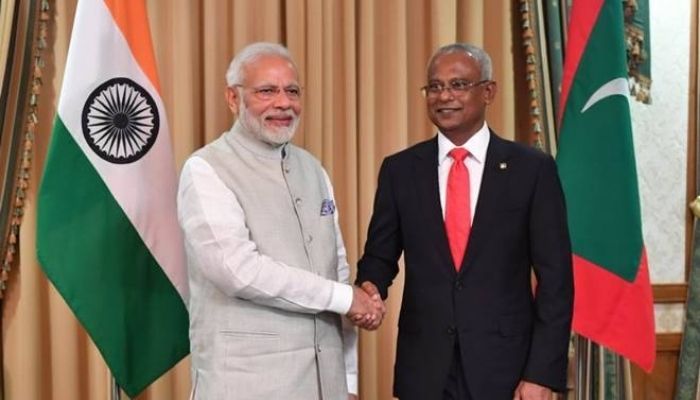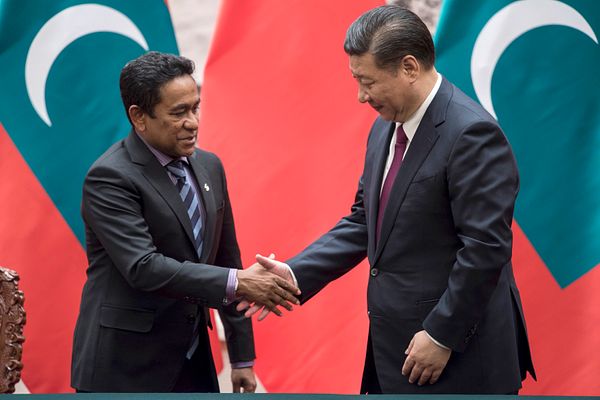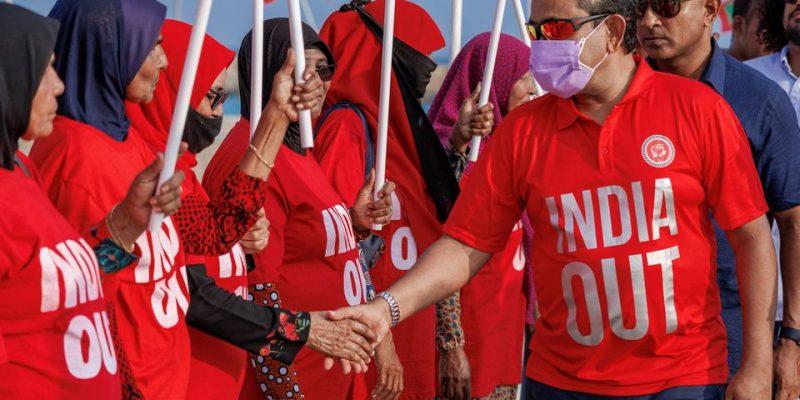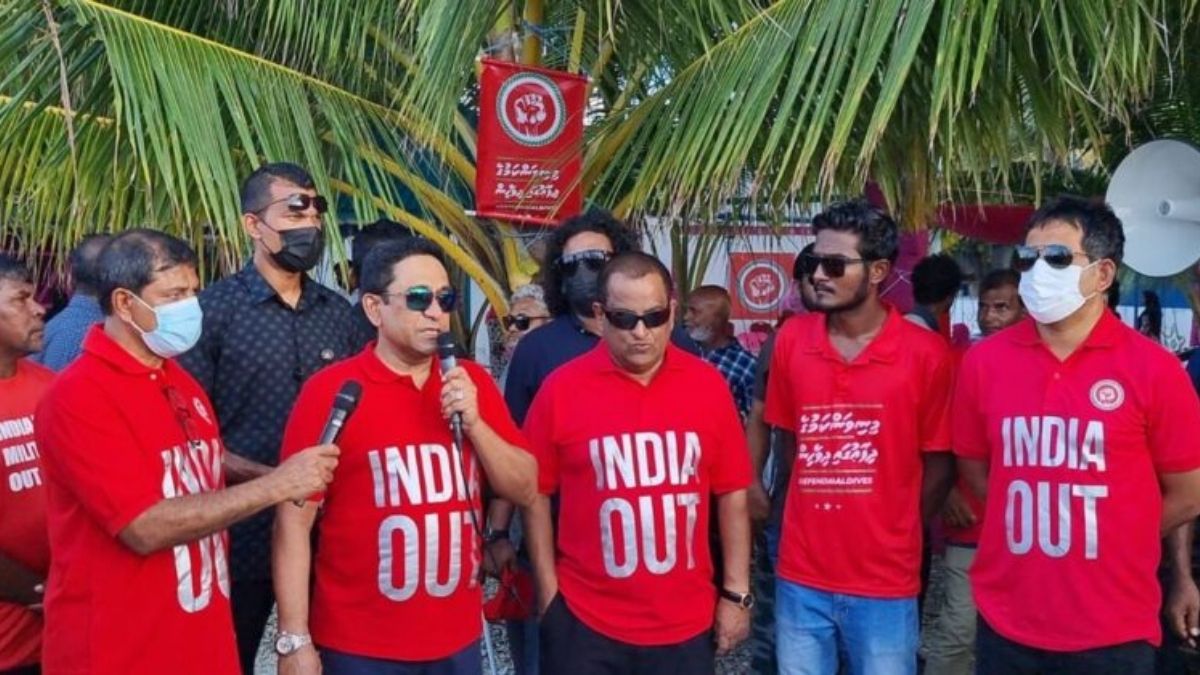Dr Mohamed Muizzu, the president-elect represented an alliance of two Opposition parties: former president Yameen-led Progressive Party of Maldives (PPM) and the People’s National Congress (PNC). Yameen had maintained a pro-China and anti-India stance during his presidential term from 2013-2018 and Muizzu, who secured 54 percent of the vote, had centered his entire campaign on the “India Out” platform.
Dr Mohamed Muizzu is consider backup for Abdulla Yameen of PPM, who is currently in jail after being convicted of corruption. Muizzu has been vociferous in ousting Indian military personnel who are in the Maldives for providing critical services such as search and rescue operations, exclusive economic zone surveillance, and medical evacuations.
Off late Maldivians realised the significance of Indian military presence in Maldives and are appealing Muizzu to call off his decisions to expel Indian military presence.
Background: India’s Relations With Maldives

India has fostered close relations with the Maldives through various agreements, including ‘SAGAR’ (Security and Growth for All in the Region) and ‘Neighborhood First’ being a net security provider in the Indian Ocean. India has long contributed to the political sanity of Maldives by preventing a military coup in 1988.
Furthermore, Indian Navy in coordination with Maldives National Defense Force have been right on the call whenever Maldives has been knocked down by a natural disaster including 2004 Tsunami and 2014 water crisis.
India has made substantial investments in infrastructure, notably the Greater Male Connectivity Project. Under this project, the Indian company Afcons provided a substantial grant of USD 100 million and extended a Line of Credit worth USD 400 million to the Maldives.
Pro-China stance of the Muizzu alliance is inching Maldives close to catastrophe. China’s debt-trap policy causing overwhelming debt and economic instability in Pakistan, Kenya, Zambia, Laos, Sri Lanka clearly illustrate China’s intent of grabbing territory to meet expansionist aspirations.
China for its own gain has integrated the Maldives into its strategic network as a crucial component of the “String of Pearls” strategy in South Asia.
What’s Happening

Since the rise of a pro-China government in the Maldives, the Indian High Commission in the country has heightened its concern over diplomatic relations. The High Commission, in this regard, has formally written to the Maldivian government for intervention and the implementation of enhanced security measures. This request stems from a series of persistent incidents characterized by derogatory articles and social media posts that have targeted the dignity of the High Commission and its diplomatic staff stationed in the country.
A recent and noteworthy development revolves around the leakage and widespread dissemination of a confidential communication from the High Commission to the Maldivian Ministry of Foreign Affairs. In this communication, the High Commission invoking the preamble of the Vienna Convention on Diplomatic Relations, asserted that these incidents are not only deliberate and malicious but have also taken on an increasingly personalized nature in their attacks.
The ensuing conversation and concerns generated by this letter within the political circles of the Maldives prompted the country’s ruling party, the Maldivian Democratic Party (MDP), to issue an official statement on July 2nd.
Specifically, the MDP’s statement identified the local news publication Dhiyares and its co-founder and writer, Ahmed Azaan. The party stated that Dhiyares and Azaan had been involved in an unceasing barrage of anti-India rhetoric, which appeared to be part of a well-funded, well-organized and premeditated political campaign with the explicit purpose of inciting hostility towards India, the Maldives’ closest ally.
Challenges and Perceptions Surrounding ‘India Out’ Campaign

While the protest and reservations against the Indian military presence initially arose through political channels during the course of last decade, it’s essential to note that these protests have also had a cascading impact on the general population of the Maldives.
The Indian Navy and Coast Guard maintain these troops, who operate a maritime patrol aircraft and two helicopters to provide critical services such as search and rescue operations, exclusive economic zone surveillance, and medical evacuations. However, this well-intentioned military assistance is unfairly viewed by many as an intrusion and the personnel are unjustly labeled as spies.
The perception among well-informed Maldivians is that Indian officials may have engaged in interactions with the former Maldivian government that exceeded standard diplomatic protocols. This perception has given rise to speculations about undisclosed military agreements with India, which have contributed to a general unease concerning the Indian military presence in the country.
This complex issue highlights the importance of transparent communication to address these underlying concerns and promote a more amicable relationship between the two nations.
It’s essential to note that the ‘India-Out’ campaign, led by active protesters, is primarily concerned with the growing Indian military presence and does not adopt a hardline stance against people-to-people relations. The protesters emphasize that they are not advocating for violent clashes with India or Indians in the Maldives.
However, the stance forwarded by the protesters just seem to be a back-handed attempt to launch stronger protests as the agitations have been brewing from the last decade and the volcano therefore might just erupt resulting in Maldives becoming extremely hostile towards India in entirety.
CONCLUSION
Strengthening the deteriorating relations is of paramount importance, and the Muizzu lead alliance is a pivotal actor in achieving this goal.
Indian High Commission should employ a multifaceted approach to communicate India’s goodwill among the Maldivian populace. This involves actively engaging with various stakeholders, including government officials, civil society, and the general public. By participatingin local events, fostering cultural exchanges, and supporting educational initiatives. Showcasing India’s positive contributions to the Maldives in fields like infrastructure, healthcare, and education is crucial.
Such efforts should underscore the tangible benefits of the bilateral relationship, demonstrating India’s commitment to the Maldives’ development and prosperity. In essence, by fostering a sense of partnership and actively addressing the concerns and aspirations of the Maldivian people will promote a more constructive relationship.

